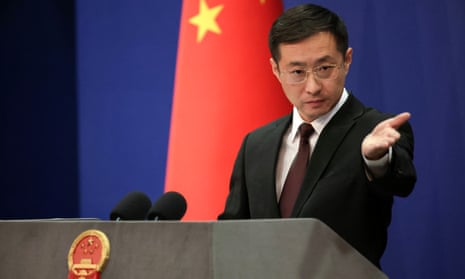China’s foreign ministry has accused an Australian navy helicopter of deliberately flying “within close range” of Chinese airspace in a “provocative move” in the latest military altercation between the two nations.
The Australian government said China released flares in front of the helicopter in the Yellow Sea as HMAS Hobart participated in an operation to enforce United Nations sanctions against North Korea.
The Australian government has maintained the helicopter was in international waters in the Yellow Sea, between the Chinese and Korean coastlines, and strongly condemned the alleged actions of the Chinese jet pilot. But in China’s first reaction to the claims, foreign ministry spokesperson Lin Jian accused Australia of making “risky moves”.
“What truly happened was an Australian military aircraft deliberately flew within close range of China’s airspace in a provocative move that endangered China’s maritime and air security in the name of enforcing UN security council resolutions,” Lin said during a press conference in Beijing on Tuesday.
Lin said the Chinese military “took necessary measures at the scene to warn and alert the Australian side”.
“The way the situation was handled was consistent with our law and regulations, professional and safe,” he said.
On Monday, the Australian defence minister, Richard Marles, described the incident as “unprofessional”, “unsafe and completely unacceptable”, saying serious concerns had been raised with China’s government.
Lin said China had raised its own “serious protests” with the Australian government, and stated that Australia should “immediately stop the provocations and hypes to prevent misunderstanding and miscalculation”. His statement did not mention, or deny, claims of the use of flares.
Donald Rothwell, a leading professor of international law at the Australian National University, said the Australian government’s reference to “international waters in the Yellow Sea” was ambiguous. He said China, South Korea and North Korea had all asserted maritime claims in the Yellow Sea and there were no agreed maritime boundaries.
The encounter occurred about 7.30pm on Saturday. Defence sources said Australian destroyer HMAS Hobart was in international waters in the Yellow Sea, participating in Operation Argos to enforce international sanctions against North Korea.
A navy Seahawk helicopter, attached to HMAS Hobart, was conducting what was described as a routine flight when it was said to have been intercepted by a Chinese J-10 fighter jet.
Marles accused the Chinese jet of dropping flares near the helicopter, 300 metres in front and 60 metres above it. He said the Australian pilot had to take evasive action to avoid the flares. No injuries were reported but Marles said the consequence of being hit by the flares would have been “significant”.
The prime minister, Anthony Albanese, said the Australian defence force personnel had been “going about their job” in international waters and airspace while enforcing sanctions.
“That is part of Australia being good global citizens and Australian defence force personnel should not be at risk whilst they’re doing that,” he told reporters in Rockhampton.
after newsletter promotion
Albanese brushed off opposition criticism about the strength of Labor’s response and insisted that his government had “made very strong representations at every level to China about this incident, which we regard as unprofessional and unacceptable”.
But Albanese reiterated that it was important for Australia to maintain dialogue with China, and confirmed that the Chinese premier, Li Qiang, would visit in June.
The shadow defence minister, Andrew Hastie, accused Albanese of being “weak in his response” to the “pattern of aggressive behaviour that we’ve seen from the Chinese People’s Liberation Army towards the ADF over the last two years”.
“I think it is high time the prime minister raised this with president Xi [Jinping],” Hastie told Sky News. “He needs to have a man-to-man conversation, set a boundary and draw a line in the sand.”
The assistant US secretary of state, Daniel Kritenbrink, said on Tuesday that the US was “deeply concerned” about the incident and expressed solidarity with Australia.
Speaking to reporters during a visit to Canberra, Kritenbrink said the incident was part of a broader trend in which China’s military was becoming “more aggressive and assertive at operating in waters and airspace on the periphery of China”.
Kritenbrink expressed concerns that such dangerous behaviour could “lead to an accident and worse”.
He praised Australia for helping to enforce UN sanctions related to North Korea’s nuclear weapons programs, and urged China to do more to implement those sanctions “rather than engaging in conduct that is viewed as unsafe”.
